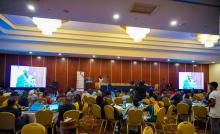WHO and partners set technical cooperation strategy to align with Nigeria's transformative health agenda
Abuja, 12 July, 2023 - Aligning with the health transformative agenda of the government of Nigeria, the World Health Organization (WHO) is reviewing its 3rd generation Country Cooperation Strategy 2018-2022 (CSS III) to identify game-changing strategic directions and alliances to support the country in strengthening its health system, achieving public health impact and better health outcomes in the next five years.
The Country Cooperation Strategy (CCS) is a medium-term strategic document that presents WHO’s vision for technical cooperation with a given member state, in support of the country's national health policy, strategy, or plan.
WHO in Nigeria has developed and successfully implemented three generations of CCS. The current CSS under review was first developed in 2014, revised in 2018 and extended to 2022 to respond to the Sustainable Development Goals (SDGs), in line with the Nigeria Economic Recovery and Growth Plan, the National Health Policy 2016, the National Strategic Health Development Plan II, the UN Sustainable Development Partnership Framework 2018-2022, the WHO Transformation Agenda as well as the WHO’s 13″ General Program of Work (GPW13).
Addressing participants at the two-day feedback workshop on the evaluation of the 3rd WHO WHO Country Cooperation Strategy (2018-2022) and identification of strategic priorities for the 4th WHO-Nigeria Country Cooperation Strategy in Abuja, Dr Salma Anas-Ibrahim, the Special Adviser, Health to President Bola Tinubu, says the workshop by WHO is quite timely with the new government prioritizing and setting its agenda for the different sectors
Dr Anas-Ibrahim explains that the government’s healthcare reforms agenda would align with the existing national health plans to improve the health fortune of the people of Nigeria and shall be hitched and defined by the concept of Universal Health Coverage (UHC), which shall be a primary objective towards new job creation that brings greater economic and social development to the Nigerian people.
“…The health needs of the citizens of this country are therefore prioritized as a fundamental human right and a matter of national security which the government shall greatly invest in for national growth, development and sustainable prosperity.
Consequently, the government shall address the lingering nation’s healthcare challenges, including inadequate health infrastructure, fragmentation, an overburdened workforce, poor insurance coverage (catastrophic out-of-pocket expenditures), high maternal and infant mortality, inadequate preventative care and dependence on imported medicines, commodities, equipment and vaccines”, she says.
In his opening remarks, the Permanent Secretary, Federal Ministry of Health Engr. Olufunso Adebiyi who was represented by Dr Ngozi Azodoh, says that the Federal Ministry of Health has started the agenda-setting process for the health sector taking into consideration, the needs of the people of Nigeria.
“As the WHO is a member state organization, the 4th Generation CCS would support the government of Nigeria to actualize these ideas, especially in coordination and building sustainable partnerships,” she says.
Delivering the welcome address, the WHO Country Representative, Dr Walter Kazadi Mulombo, says the workshop is to co-create a strategic health agenda which aligns with WHO’s collaboration with other United Nations bodies and development partners at the country level based on identified priorities and needs.
Dr Mulombo explains that member states at the recently concluded 76 World Health Assembly set the pace for accelerating health to achieve the 13th General Program of Work (GPW13) and Sustainable Development Goals and targets by 2030. Nigeria, like the rest of the world, has experienced a setback due to COVID-19, in main health indices including maternal, neonatal and child health, requiring innovative ways of working to close the gap.
He says the development of a new CCS usually follows robust consultative processes and WHO has been engaging with the stakeholders over the past few months to understand what has been done right, the areas we have not done well, and the pointers to the priorities in the next five years.
“This workshop is unique in the history of the WHO Nigeria, considering the critical changes within the global health architecture and political economy of the country, as demonstrated by (i) the development of the Nigeria National Development Plan 2021-2025, the UN Sustainable Development Cooperation Framework 2023-2027, the WHO functional review, and most recently, the WHOs 5 priorities (promote health, provide health, protect health, power health, and perform for health. ) to accelerate achievement of the SDGs within the extended GPW13.
I am confident, that this strategic stakeholders’ engagement, will come up with new realities for joint strategic health agenda for WHO’s technical cooperation in Nigeria in the next five years so that jointly, we will promote health, provide health, protect health, power health, and perform for health”, he says.
A recurring challenge thrown at WHO during the ongoing review is that the international health agency needs to be more innovative and agile to adopt a stronger coordination role as a leading authority in support of the country and partners.
To identify priorities for the fourth CCS, notable stakeholders including the Special Adviser to the President on Health, the Permanent Secretary, the Federal Ministry of Health and Senior Directors, Legislators, Heads of Agencies and Parastatals, State Commissioners of Health, Permanent Secretaries and health leaders at the sub-national levels, development partners, civil society groups, the media, private sector, and community member evaluated the 3rd CCS document and proffered areas for improvement.
Technical contact:
Dr Francis Ukwuije; Email: ukwuijef [at] who.int (ukwuijef[at]who[dot]int)






